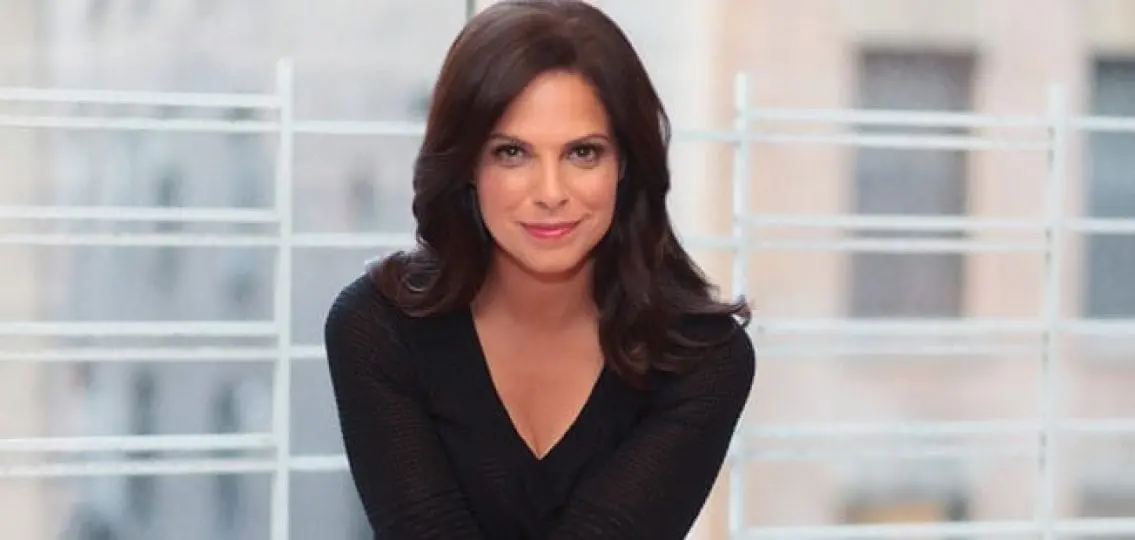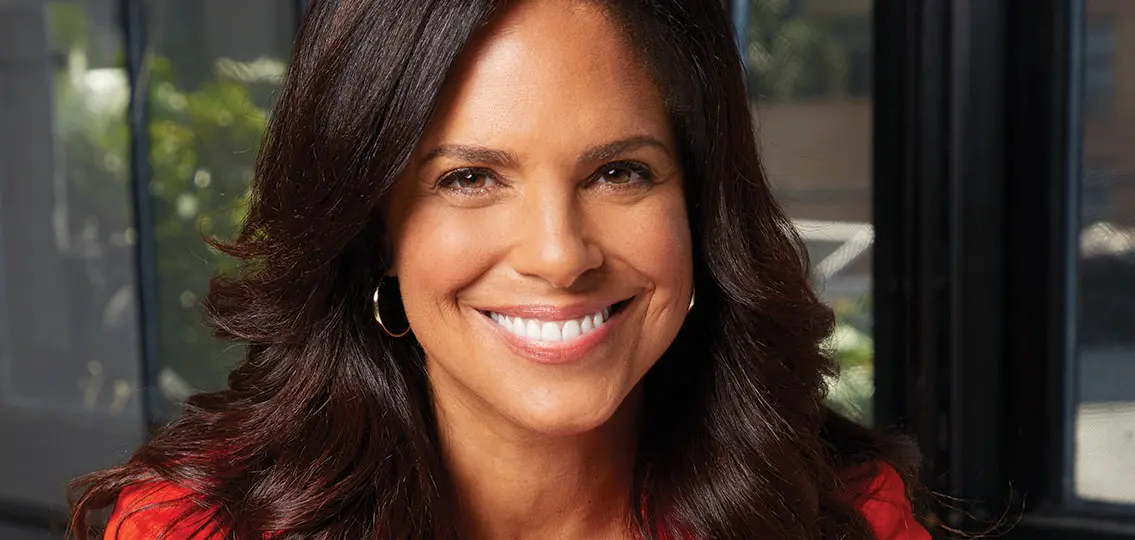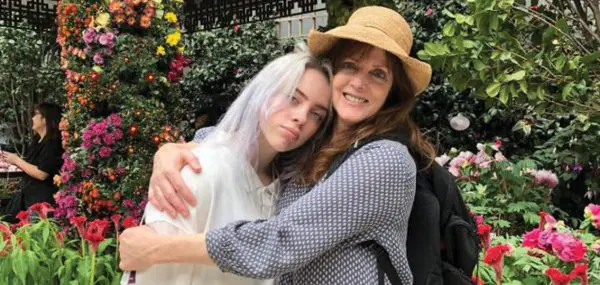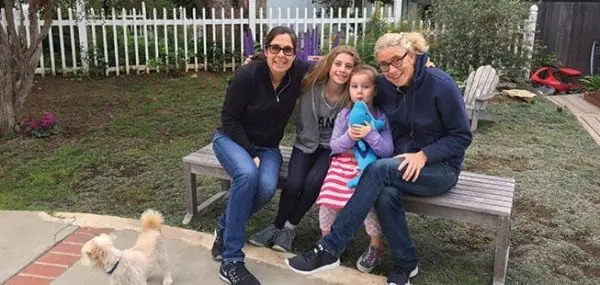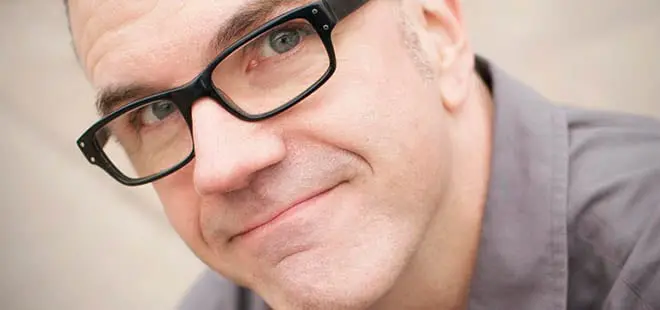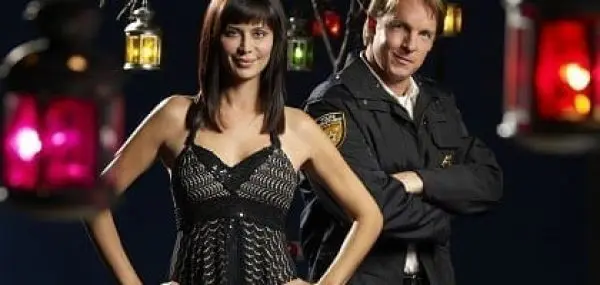You probably know her best as a broadcast journalist who has reported for CNN, Weekend Today, and HBO’s Real Sports with Bryant Gumbel. Or perhaps you follow her outspoken Twitter account. Soledad O’Brien is also the CEO of Starfish Media Group and the co-founder and board chair of PowHERful, an organization that provides mentoring and support to get low-income girls to and through college. And did we mention she and her husband are raising four teenagers? She spoke with us about the lessons she learned from her parents, and how they affect her own parenting style.
Q: You’ve been open about having recently lost both your parents. The way you speak about both of them, they sound like such remarkable people. I am curious how they impacted the parent that you are today.
O’Brien: I think they were remarkable people, but they were also just very much basic, involved parents. My mom was a teacher, my dad was a professor, they were both home by 5, we had dinner at home every night together. They were very solidly middle class, with a lot of kids. That didn’t mean a lot of big vacations; that meant camping vacations. The way it’s affected my parenting and the other work that I do is I recognize the value of just being there and giving people a sense of stability. We just didn’t have any drama.
Q: You also had love, right?
O’Brien: Yes, I would say my parents definitely had a sense of love, but also of respect: You can do great things; you are a fully functioning smart human being. I appreciate the love, certainly, but the respect meant that they trusted you to make smart choices and do great things in your life.
Q: Do you feel like you and your husband are giving that to your children?
O’Brien: Gosh, yes, I think we try to give it to our kids. We try to give it to the young women who are scholars [with PowHERful foundation.] A sense that you’re good enough, you’re perfect, even if you’re a slob, and you run late, and you keep losing your wallet. That’s okay, that’s who you are. You get to be you. It’s really seeing people as individuals, not as an extension of you, like if my kid goes to “X” school, somehow I look better. And certainly not that they have to accomplish something to be seen as valuable.
Q: Compared to earlier generations of parents, there are lots of people doing way too much for their kids. Why do you think we see so many parents helicoptering?
O’Brien: I understand that instinct because no one wants to see anyone suffer. When my parents were dying, I wish I could have gotten in there and said, “I’ll take the medicine, I’ll do what I have to,” but life doesn’t really work that way. Truthfully, as they grow up, they have to learn how to fall and get back up. The key is the getting-back-up part. That’s where the lesson is. I think because I travel a lot, and my husband is of the same mindset, we just don’t have a huge instinct to block and tackle for our kids.
Q: What wisdom from your parents have you shared with your kids?
O’Brien: My mom was a big list-maker, and I’m a big list-maker. I just find it so very helpful to start with a list. Every day I make a list about what I am going to accomplish, even on my vacation. I think the way to keep yourself on track, especially after a disappointment, is to have a list. Go ahead and be sad for a little bit, but then start a new list of what you are going to do next.
Q: You have twin boys who are 14, and two girls who are 17 and 18. Is your oldest headed to college? How are you doing with that?
O’Brien: I’m excited for her. I’ve never been the weepy mom. I’ll definitely miss her being around, but I’m excited for her, and that definitely outweighs any kind of loss for me.
Q: You sound like a chill parent. Do you have any rules in your house around technology and curfew, things like that?
O’Brien: I’ve got four kids; of course I’ve got rules around technology and curfew. People can’t take their technology to bed, so they have to give it to me. It’s kind of a weird rule for me. Just in case someone calls me about a news story, I tend to keep my phone nearby, but I’ve gotten better about moving it to the next room.
For curfew, it really depends. My daughters are 17 and 18, so it really depends on the person, the party, what time of year it is. But we’re very strict about people checking in and making sure I know where they are. I think we just try to keep a lot of open lines of communication while making sure everybody sticks to the rules.
Q: Last time we spoke to you, which was several years ago, you said you hadn’t had any of the teenage terrors that you’d heard about. Do you still stand by that?
O’Brien: Yes. They are so much more fun as teenagers than they were as toddlers. I always thought the myths about this are just not true; they’re really fun, they’re smart. You want to travel and do stuff with them. I think when they were younger, it was just, “This has to go here, we’ve got to pick up this person, I’m late, I forgot to get this.” It was very stressful. Now, vacations are fun because the kids are very self-entertaining. I feel like I’m reaping the benefits, finally.
Q: How do you deal with online criticism? Do your kids see it and get bothered by it?
O’Brien: I think they treat it like I do; it means nothing to me. I remember once I posted a picture of myself and my daughter Cecilia, and someone said she was ugly, and she just laughed about it. This person is obviously nuts; who cares. I don’t think she thinks anyone on Twitter is somebody so important that you have to worry about their opinion.
Q: Tell me about your foundation, PowHERful.
O’Brien: It’s going great. Every year we send about 25 girls to and through school. We have a young woman who got her Ph.D. in nursing, and another one of our scholars got her degree in law at Berkeley. This year we’ll have three more people graduate, and one of our scholars got two job offers from IBM. I love what we’ve done, I like that it’s small and hands-on, so I know every single person and I feel like I’m very personally committed to help them.
Q: I just watched your BET special, “American Injustice.” A lot of your reporting touches on such weighty issues, and yet you seem like such an optimist.
O’Brien: I get what you’re saying. It’s certainly not the same as when I would cover a disaster. You really feel emotionally wrecked when you come home from a tsunami or an earthquake because you’ve seen so much devastation. Realistically, the world is full of tough things. I don’t know that that has any bearing on whether or not I’m optimistic. My parents both just died in the last 45 days. I’m sad about losing them, but I’m still optimistic.
Q: I think you are the ultimate in resilience.
O’Brien: I lost my luggage on Sunday; I was headed to Phoenix for an award but with no clothes. Then I went to Los Angeles with no clothes, and then I went to Boston with no clothes, and then I came to D.C. today with no clothes, except for stuff that I picked up in the gift shop. I don’t feel particularly resilient. I got on my flight to Los Angeles and I was so overwhelmed and tired and upset, and I started to cry. I had my moment, I made my list, and I was lucky because there was a gift shop where I was able to buy stuff, and it was good enough. A lot of times, it’s less resilience and more just being flexible. Cry, kick the wall, be unhappy, then get out your pad and make your list.
